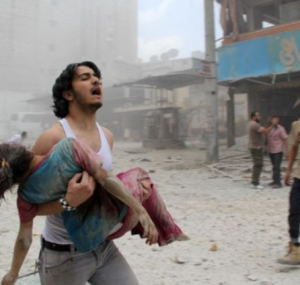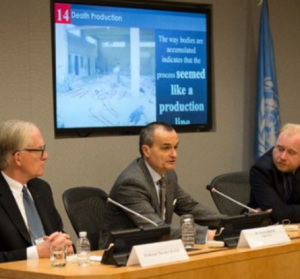
Dear Deeply Readers,
The unimaginable has a way of happening fairly often these days in the space in and around Syria’s war.
This week it was a nightmare scenario, unfolding in the march of the Islamic State of Iraq and Syria (ISIS) on Mosul and a host of Iraqi cities, overwhelming that country’s military power.
“If ISIS manages to hold onto its turf in Iraq, it will control an area the size of Jordan with roughly the same population (6 million or so), stretching … from the countryside east of Aleppo in Syria into western Iraq,” the Economist writes.
“The state of Iraq is in imminent collapse,” Faisal Istrabadi, Iraq’s former deputy ambassador to the U.N. told the Financial Times.
All of this is a result of an estimated 6,000 ISIS fighters in Iraq and 3,000 to 5,000 in Syria, several hundred of them from the West, according to the Economist report. It and others have noted that the ISIS surge in Iraq was a direct result of the war in Syria; left unchecked, the conflict has given ISIS a foothold in the power vacuum. For months, the Syrian city of Raqqa has served as the de facto ISIS capital, its takeover of Syrian oil has provided recurring revenue, and its operations expanded – in line with its dreams of an Islamic caliphate that stretches across state borders.
North of Deir Ezzor, “the border has been porous for some time, and ISIS has been able to use it with impunity,” says Aymenn al-Tamimi, a fellow at the Middle East Center who studies Syrian military dynamics.
As our Karen Leigh reports, ISIS’s gains in Iraq now strengthen its hand and position in Syria’s war.
“The spoils from Iraq definitely give them additional military and financial resources to devote here,” al-Tamimi said. That includes the $425 million in cash lifted by ISIS from Mosul’s Central Bank and oil assets now in its possession.
“The conflicts in Iraq and Syria have long been fusing,” International Crisis Group told us. Through the eyes of ISIS, they form one continuous battlefront.
To chart the implications, we’ve picked out four major takeaways from this week – elements of the fallout from the ISIS ascendancy that are likely to have major consequences for Syria, Iraq and the Middle East as a whole.
1) U.S. containment strategy isn’t containing anything.
President Barack Obama’s long-held position on Syria was echoed in his Friday speech on the situation in Iraq, which was something along the lines of: “The U.S. can only do so much.” Reluctant and limited military engagement is under discussion. Meanwhile, Washington sends a modicum of weapons, training and support – without getting its hands too dirty. Allies like Saudi Arabia, Jordan and Turkey are left to pick up the slack, supporting the rebels we find palatable in whatever ways fit with their respective national interests.
It’s a dangerous, passive-aggressive form of foreign policy – a wishful containment strategy that hasn’t contained much at all.
The ISIS expansion was “a loud wake-up call for those leaders – in the West, the East and in between – desperately hoping all they need to do is provide governments with weapons and money, and sit back,” wrote the defense and security analysts at the Guardian.
But Obama’s speech did not reflect that urgency, instead framing ISIS as “a regional problem … a long-term problem.” He said the U.S. would combine “selective actions by our military” with “a very challenging international effort” to boost the strength of the Iraqi state. He was not especially confident or specific in describing how that would happen, at a point when the Iraqi security establishment has functionally disintegrated.
2) We’re facing all-out sectarian war, beyond any state control.
What had long been a deadly, simmering sectarian conflict putting Sunnis against Shiites has just exploded.
This week the most powerful Shiite cleric in Iraq, Ayatollah Ali Sustani, issued a rare call to arms compelling his followers to fight the Sunni extremists of ISIS. His deputy told them to protect Shiite Islam’s holy shrines in Karbala, Najaf and other locals. Adherents have reportedly begun to enlist at their local mosques.
In the same beat, the ultra-conservative Sunni leaders of ISIS called on supporters to fight against Shiites – practically daring them to desecrate the most sacred Shiite landmarks.
“We have a score to settle,” said ISIS spokesman Abu Mohamed al-Adnani in an audio recording cited by the Financial Times. “We will settle our differences … in Karbala, the filth-ridden city, and in Najaf, the city of polytheism.”
3) The U.S. and Iran, rivals in Syria, could be fighting on the same side in Iraq.
There are times in the Middle East when U.S. and Iranian interests align, and we’re quickly approaching one of them. The U.S. doesn’t want to see ISIS in the ascendant; Iran doesn’t want ISIS to overwhelm the Iraqi state. They both see Iraq’s Prime Minister Nouri al-Maliki as an ally, though he’s had a strained relationship with Washington.(With an authoritarian and highly polarizing leadership style, some Iraqis see him as a new Saddam Hussein serving a Shiite constituency.)
While they haven’t publicly acknowledged the possibility of working together, both the U.S. and Iran have said they’re ready to help Iraq’s government counter the ISIS threat. President Obama hinted at the possible use of air power – unmanned drones or manned aircraft – while the head of Iran’s Qods Force, Major General Qassem Soleimani, has reportedly been in Baghdad to discuss ground support. Despite locking horns over President Bashar al-Assad, among other issues, the U.S. and Iran may be forced to collaborate if they want to effectively deflate the rise of ISIS.
4) By beating back ISIS, Kurds have sealed their independence.
Outperforming Iraq’s own army by a long shot, Kurdish fighters of the peshmerga were able to beat back ISIS from their territories, going even further to win control of the oil-rich jewel of Kirkuk, a city that the Kurdistan Regional Government had long hoped to absorb into its borders.
“As ISIS rolls towards Baghdad, Kurds are gaining oil, ground and power,” read one headline in Foreign Policy, smartly entitled Revenge of the Kurds. That helps cement Kurdistan’s functional independence from Iraq’s central government; it means a stark hangover for Iraq and shot of empowerment for Kurdish minorities in countries like Turkey and Syria.
“This may be the end of Iraq as it was. The chances that Iraq can return to the centralized state that al-Maliki was trying to restore are minimal at this point,” Marina Ottaway of the Wilson Center told Foreign Policy.
“Things are definitely going in the right direction for Kurdistan, as long as ISIS leaves them alone.”
In Other News, Syria’s War Carries On
As attention is focused on ISIS, fighting continues across Syria. The AP reports that a car bomb exploded in a pro-government neighborhood Thursday, killing at least seven people. In Damascus, a mortar shell killed one person and injured four others in a southern residential neighborhood.
CNN’s Nick Paton Walsh reports from rebel-held Aleppo, which he calls a “skeleton” of the city he first visited 22 months ago.
“We are in hell, just go outside, the city is flattened,” one resident told him.
In the same city, snipers are shooting at children.
“Children in Aleppo cannot escape their nightmares. Snipers maim and kill them in the street. Airstrikes crush them at school and at home,” wrote Dr. Samer Attar.
“In one day, we treated three children shot in the abdomen by snipers. All of them were saved in underground operating rooms. We could not save the boy shot in the head.”
In Lebanon, children are being compelled to work as child laborers – 80% of them working in the fields as agricultural labor, as young as 10 years old. The Guardian published a photo essay telling their story.
With no sign of a solution to Syria’s war – only escalation and complication, thanks to ISIS – former U.N. envoy Lakhdar Brahimi said the country could become a “failed state,” similar to Somalia.
“It will not be divided, as many have predicted. It’s going to be a failed state, with warlords all over the place,” he told Spiegel online.
The former U.S. ambassador to Syria Robert Ford echoed that assessment. He said his resignation was the result of feeling helpless in the face of an ineffectual U.S. response.
“As the situation in Syria deteriorated, I found it ever harder to justify our policy. It was time for me to leave,” he wrote in an oped for the New York Times.
“We must have a strategy that deals with both Mr. Assad and the jihadists,” said Ford. As of this week, that strategy will be even harder to produce.
Highlights from Syria Deeply:
For ISIS, Iraq’s Spoils Could Tip Balance in Eastern Syria
Syria ER: Out of Cash, a Hospital Is Forced to Close
Syrian Rebels Unite to Fight Off an ISIS Eastward Push
Conversations: After Rounds on the Rebel Battlefield, a Return to Civilian Life
Arts + Culture: Meet the Rebel Artist Painting on Mortar Shells
Underfunded Aid Organizations Battle Donor Fatigue, Revise Delivery Plans
Murder of Arab Families in Hassakeh Points to Rising Tensions Between Islamists and Kurds
One on One: Roy Gutman, Middle East Correspondent, McClatchy Newspapers
Headlines from the Week
Carnegie Middle East Center: Syria’s Very Local Regional Conflict
The Guardian, in Pictures: Syrian Refugee Children in Lebanon Forced to Seek Work
Washington Post: Famed Syrian Storyteller’s Life Upended by War
Associated Press: Syrian Woman Survives 700 Days of Blockade
Daily Beast: Syria’s Guardian Angels Turned Refugees
NPR: In One Map, the Dramatic Rise of ISIS in Iraq and Syria
Human Rights Watch: ISIS Summarily Killed Civilians
We’re fielding your feedback on how to better serve you and cover the story. You can reach our team on email at info@syriadeeply.org.
Sincerely,
The News Deeply Team



